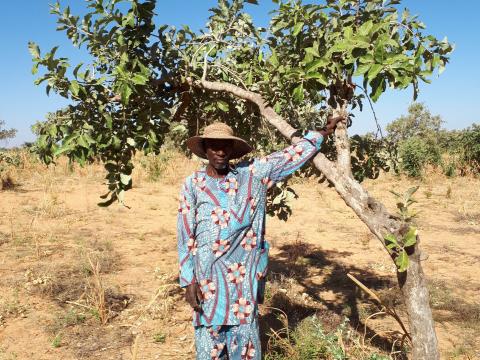Farmer Managed Natural Regeneration, one of the solutions to a rational management of our resources

In Niger, Agriculture is the main economic activity of the population. Indeed, it employs 86.9% of the working population (Agter, 2017). However, it is facing constraints; the most significant of which is climate change – the main cause of the drought in Niger. Additionally, the demographic pressure has dramatically reduced the number of farmed areas per household. Overexploitation of land has accentuated degradation. Thus, few producers are able to meet their food needs through their own productions. To provide less expensive and sustainable solutions, the Regreening Africa project supports small rural producers to strengthen their resilience, as well as increase their food security and livelihoods through agroforestry. In particular, the technique of Farmer Managed Natural Regeneration (FMNR) is used to help boost their agricultural production.
The programme identified model adopters, 'pilot producers', such as Daouda Djibo, and set up in each intervention village a committee to monitor and manage natural resources. This is not only responsible for the control and good management of natural resources but also for monitoring actions and data collection.
Aged 70, Daouda Djibo (commonly known as Malam Chika Guessé) is a resident of the village of Guessé Sinsan in the commune of Simiri, Tillabéri region. He is married, a father of ten children, and grandfather of fifteen grandsons. Agriculture is his main economic activity. In his field, we mainly find the following species: Guiera senegalensis and Combretum glutinosum. These species contribute enormously to soil fertility through their biomasses (Christian et al.).
Daouda’s field was cultivated by his father who bequeathed it to him. This field has experienced overexploitation without any adequate practice allowing it to regenerate. His millet productions were declining year after year in the face of this problem. Daouda decided that the search for an alternative was essential.
"I inherited the field that I cultivate from my father. Over time, my crops were not good at all. I had a lot of difficulty taking care of my family. It was then that I had the idea of opening a Koranic school. Parents gave me voluntary contributions in cash as well as in kind that helped me to partially cover my needs and those of my family.
One day, I visited the area chief of Simiri who was an agronomist. During our talks, he spoke to me about the importance of FMNR. Since that day, I have made the decision to leave the trees in my field ".
Daouda also benefited from awareness sessions as well as technical support thanks to the intervention of Regreening Africa, which allows him to carry out clearing in his field. Today, it is his field that supplies his household with firewood and service wood throughout the year.
“Before the adoption of FMNR, my wife and children had to travel more than four kilometres to fetch wood in pastoral areas, which accentuated the degradation of these spaces. This year, I obtained for the first time a yield of 210 kg/ha for millet and 239 kg/ha for cowpea. Before, I could have never had this kind of production. Today, the agricultural production of my field has improved thanks to FMNR; the species that are in my field improved my field’s fertility. I use the leaves of the trees to feed my animals. Also, we take the leaves from these trees to treat certain diseases”, Daouda says happily.
Today, Daouda, a pilot producer, is a point of reference for FMNR in his village and even in the commune of Simiri. He raises awareness and supports producers to practice FMNR. During NOCC's visit to his field, environmental officials said he will likely be the future national winner of the Best Producer Award in FMNR.
It should be noted that the management of trees in our land is still a problem; in the sense that we are still witnessing the removal of green wood in the absence of country owners. Monitoring committees need to be strengthened in order to carry out their missions and also to continue to sensitise communities to respect the various provisions of the specific decree of FMNR. Because the enjoyment of trees in agroforestry parks resulting from FMNR is given priority to the owners of the fields (Article 3 Paragraph 2, FMNR Decree). Also, the relationship between monitoring committees and municipal services in charge of the environment should be strengthened